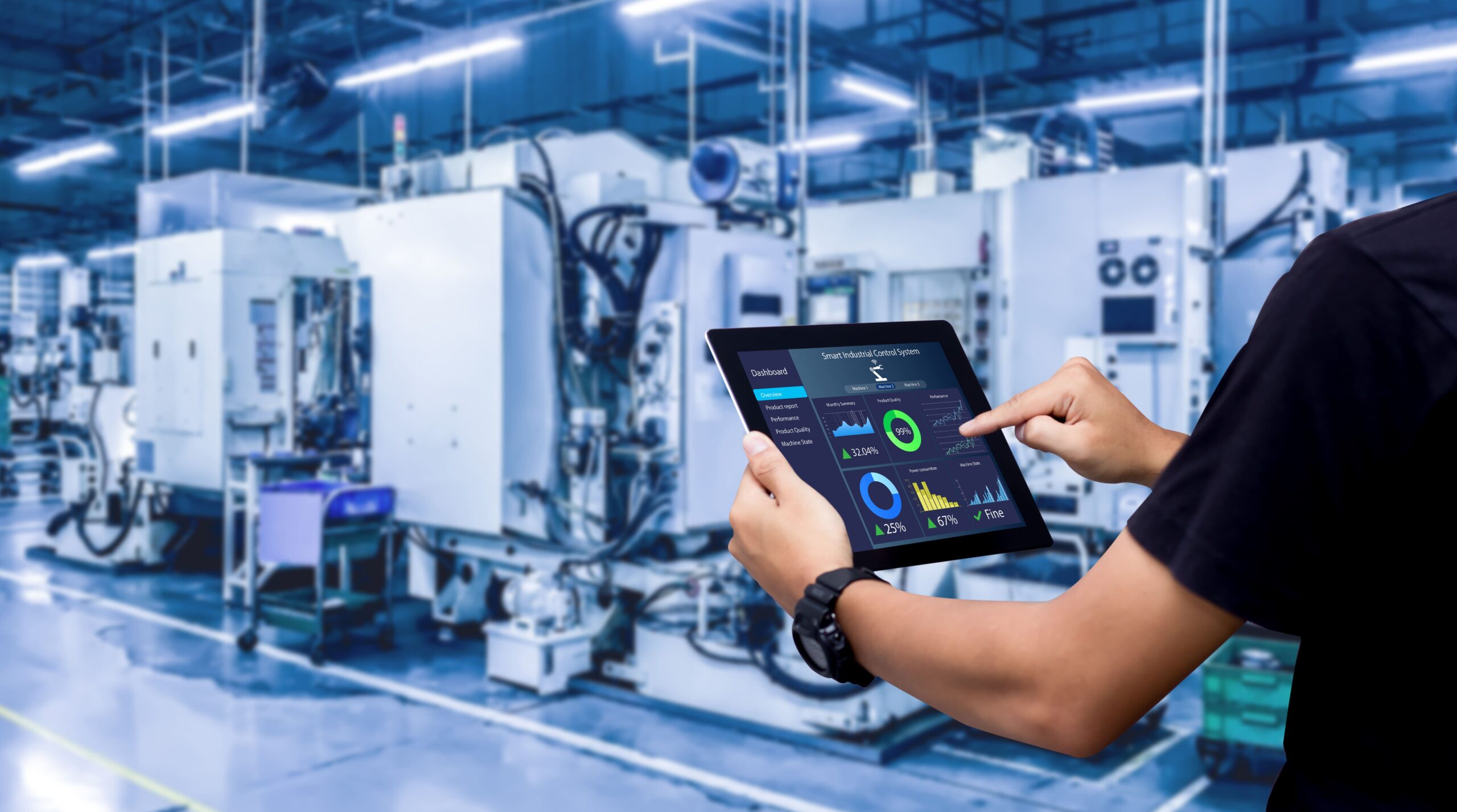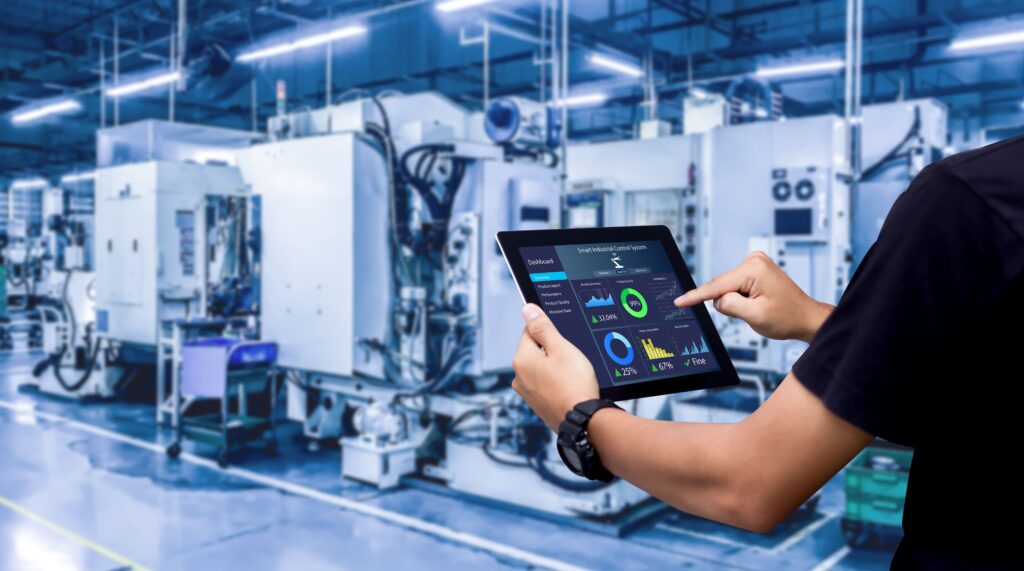
The role of AI in manufacturing
AI in manufacturing: it optimizes processes, manages supply chains, and controls quality. Its adoption drives competitiveness.
In an increasingly competitive and dynamic business environment, the manufacturing sector faces a series of challenges that demand innovative and efficient solutions. In this article, we will explore how artificial intelligence (AI) has become an essential tool to address these challenges and how its adoption can be key to enhancing value in the manufacturing sector. Additionally, we will analyse the future trends shaping the evolution of AI in manufacturing.

Table of contents
Challenges in the manufacturing sector
The manufacturing sector confronts significant challenges that can impact its productivity, efficiency, and competitiveness in the market. Some of these challenges include:
Operational efficiency
Optimising production processes and reducing operational costs are critical aspects for success in the manufacturing sector. However, achieving maximum operational efficiency can be challenging due to the complexity of production systems and the need to adapt to changing market demands.
Supply chain management
The manufacturing supply chain is an interconnected network of suppliers, manufacturers, and distributors that requires precise management to ensure efficient flow of materials and products. Challenges such as lack of visibility in the supply chain, unpredictable demand, and disruption risks can affect a company’s ability to fulfill its commitments and meet customer expectations.
Product quality
Maintaining high-quality standards is essential for a company’s reputation and competitiveness in the manufacturing sector. However, identifying and correcting defects in a timely manner can be challenging, especially in high-speed and high-complexity production environments.
How Artificial Intelligence can address these challenges?
According to this article about the applications of artificial intelligence in manufacturing operations, the rapid evolution of AI technologies has the potential to radically transform the manufacturing industry, although future adoption will depend on effective risk management and adaptation to the specific needs of each company.
Artificial Intelligence represents a powerful tool to address the challenges facing the manufacturing industry. First, through process optimisation, AI can analyse large volumes of production data to identify patterns and trends that improve efficiency and reduce unplanned downtime. By identifying data-driven areas for improvement, companies can implement proactive changes that optimise productivity and product quality.
In addition, AI has a significant impact on supply chain management. By analysing real-time data and forecasting future demand, AI improves supply chain visibility and efficiency. This enables companies to more effectively manage inventories, optimise delivery routes and make informed decisions about production and distribution. AI’s ability to analyse images and sensor data also facilitates rigorous quality control by detecting defects early, resulting in higher quality end products and a lower waste rate. Overall, the adoption of AI solutions can boost competitiveness and efficiency in modern manufacturing.
Future trends: the evolution of AI in Manufacturing
As technology continues to advance at a rapid pace, the role of AI in manufacturing sector is poised to undergo significant evolution. In this section, we will explore emerging trends and future developments shaping the future of AI in manufacturing.
Integration with IoT
One of the major trends in AI in manufacturing is its integration with other cutting-edge technologies such as the Internet of Things (IoT). By combining AI with IoT sensors and actuators, manufacturers can create intelligent systems that can monitor, analyse, and optimise production processes in real-time.
Advances in predictive analytics
Predictive analytics is another area where AI is expected to have a significant impact on manufacturing. By analysing large amounts of historical and real-time data, AI algorithms can identify patterns and trends that may not be evident to human operators. This enables manufacturers to anticipate equipment failures, optimise maintenance schedules, and minimise downtime, leading to increased productivity and cost savings.
Rise of autonomous production systems
The concept of autonomous production systems, where machines and processes are capable of operating independently with minimal human intervention, is gaining traction in the manufacturing industry. AI-driven algorithms can enable machines to make autonomous decisions based on real-time data, such as adjusting production parameters to optimise efficiency or reconfiguring workflows in response to changes in demand.
Emergence of smart factories
Smart factories represent the culmination of AI and digital technologies in manufacturing. These factories are characterised by interconnected systems, intelligent machines, and data-driven decision-making processes. AI plays a central role in enabling smart factories to achieve objectives such as predictive maintenance, just-in-time production, and mass customisation, ultimately driving greater efficiency, agility, and competitiveness.
Research and innovation
The future of AI in manufacturing is also shaped by ongoing research and innovation in the field. From reinforcement learning for adaptive control to computer vision for quality inspection, these advancements promise to unlock new capabilities and drive continuous improvement in manufacturing operations.
Driving the future of manufacturing with Artificial Intelligence
In this article, we have explored how artificial intelligence (AI) has become an essential tool to address the challenges of the manufacturing sector and how it is shaping the future of the industry. From process optimisation to supply chain management and quality control, AI offers innovative solutions that can improve efficiency, productivity, and competitiveness in the market.
Additionally, we have analysed the future trends that are transforming the way AI is utilised in manufacturing. Integration with the Internet of Things (IoT), advances in predictive analytics, the rise of autonomous production systems, and smart factories are just some of the trends that promise to revolutionise the industry in the coming years.
In an increasingly competitive business environment, the adoption of technologies like AI is crucial to stay relevant and competitive. Companies that harness the potential of AI will be able to maintain a sustainable advantage over their competitors and lead the way towards a more efficient, agile, and competitive manufacturing future.

